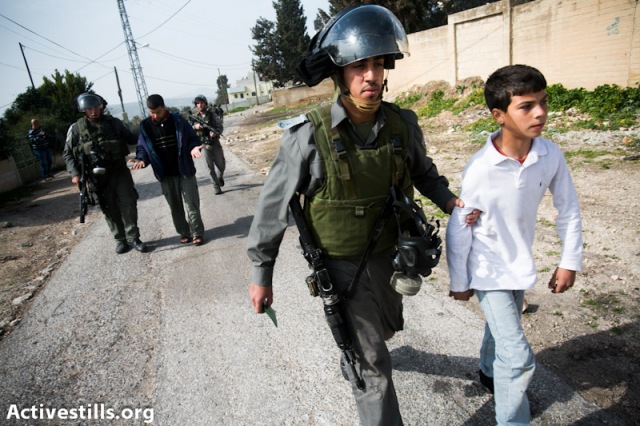Nearly two years after Israel said it would work to improve its treatment of the Palestinian children it detains, there have been a few small positive developments. But ill-treatment of Palestinian minors still appears to be ‘widespread, systematic and institutionalized,’ a report by Military Court Watch says.
By Gerard Horton

In September 2011, a delegation of nine lawyers from the UK, including a former attorney general and Court of Appeal judge, visited Israel-Palestine to investigate the treatment of children in Israel’s military judicial system. The resulting report – Children in Military Custody – published in June 2012, found that Israel’s military detention of children violated at least six articles of the UN Convention on the Rights of the Child and two articles of the Fourth Geneva Convention.
Eight months later, UNICEF came out with its own report – Children in Israeli Military Detention – which concluded that “the ill-treatment of children who come in contact with the military detention system appears to be widespread, systematic and institutionalized.” In response to these findings, Israel’s Foreign Ministry announced that it would “study the conclusions and work to implement them through on-going cooperation with UNICEF.”
Two years on, Military Court Watch (MCW) has published a report that reviews progress made in implementing the UK report’s 40 recommendations and finds that just 5 percent have been substantially implemented. While there have been a number of noteworthy developments during the past two years, including: a reduction in the time in which children must be brought before a military court judge for the first time; and the introduction of a pilot scheme to issue summonses in lieu of night-time arrests; children continue to report being ill-treated and denied basic legal rights. Following a review of developments and an analysis of 105 testimonies, MCW’s findings include:
1. More children than last year report being tied and blindfolded upon arrest;
2. More children than last year report being transported on the metal floor of vehicles; and
3. More children than last year report being subjected to physical violence.
While there has been a slight decrease in the number of children arrested at night following the introduction of the pilot scheme to issue summonses, 67 percent of these summonses were served in the middle of the night by the military. And while it is the case that slightly more children are now being informed of their rights, 78 percent of children are not told of their right to remain silent and 90 percent are prevented from consulting with a lawyer prior to questioning. At the conclusion of the interrogation stage, more children than ever before are being shown, or made to sign, documentation written in Hebrew and taken before military courts that still boast an overall conviction rate above 99 percent.
Read +972′s full coverage of children under occupation
Based on the evidence, and the cumulative impact of the treatment on children, MCW is unable to provide an alternative assessment to the conclusion reached by UNICEF in March 2013, that: “the ill-treatment of children who come in contact with the military detention system appears to be widespread, systematic and institutionalized throughout the process, from the moment of arrest until the child’s prosecution and eventual conviction and sentencing.”
Since officials at the Foreign Ministry announced that they would be looking at ways to implement the recommendations contained in both the UK and UNICEF reports, the task of doing so has been delegated to the chief military prosecutor in the West Bank, himself a resident of a West Bank settlement built in violation of the Fourth Geneva Convention – the same Convention that establishes the jurisdiction of the military courts. This fact alone raises a question mark over how genuine the civilian and military authorities are about implementing real and lasting change in accordance with international law.
Gerard Horton is a lawyer and co-founder of Military Court Watch. Gerard has worked on the issue of children prosecuted in the Israeli military courts for the past seven years and is the author of a number of leading reports on the subject.
More on children under occupation:
Palestinian kids detail abusive interrogations, arrests
WATCH: Where kids are arrested for not having a mailbox
Testimonies: Systematic abuse, beatings and threats against Palestinian children

